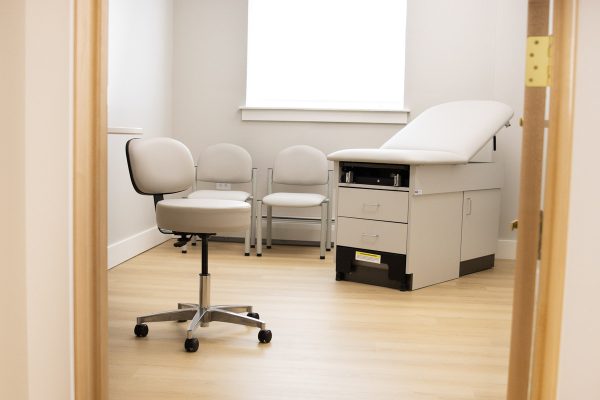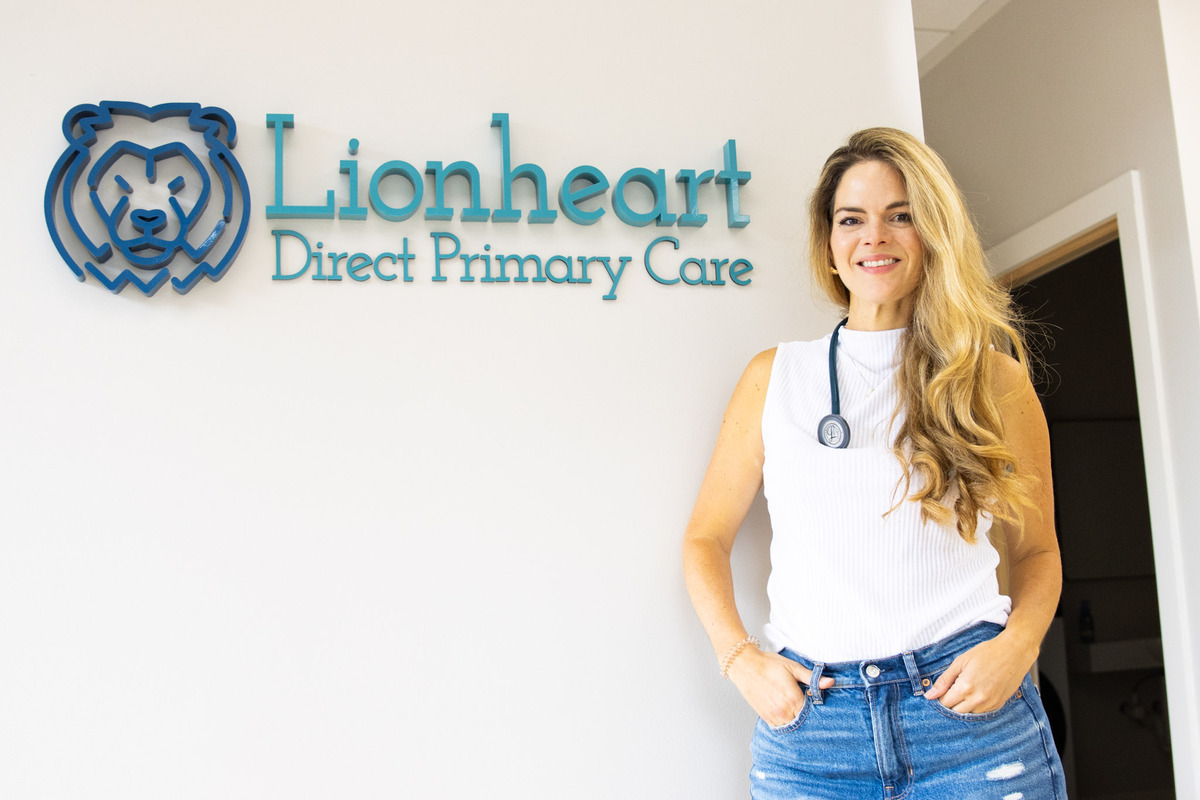Maria Rutmann was burnt out.
Approaching her eighth year as a pediatrician with Northern Light Health in Presque Isle, she worked in perennial frustration with the system she operated in. Patient visits were getting shorter and shorter. She was not offering care that met her standards.
She had reached a breaking point.
“Administration was just asking unreasonable amounts out of us,” Rutmann said. “I’m very efficient, so when I’m tapping out, we’ve got a problem.”
She put all options on the table: a fellowship, changing specialties, quitting medicine altogether. Then her husband sent her a podcast that covered a new model of health care — direct primary care. There was the solution.
“The more I heard, the more interested in it I became,” Rutmann said. “As I was wrapping my head around the model, it was the answer to so many of the issues that I was having.”
In September, Rutmann will open her own direct primary care practice: Lionheart DPC. Located in a sleek white renovated office at 209 State St., its the first of its kind in Presque Isle, and just the second direct primary care provider in Aroostook County.
 One of five exam rooms at Lionheart DPC. Credit: Cameron Levasseur / The County
One of five exam rooms at Lionheart DPC. Credit: Cameron Levasseur / The County
It will begin as a pediatric practice, serving patients up to age 25, but Rutmann hopes to eventually bring an adult provider on board.
Direct primary care is designed to eliminate insurance from the equation. Patients pay a flat monthly fee, like a subscription service, and get access to most things typically offered under the primary care umbrella without the surcharges added in the traditional “fee-for-service” model.
“You get a swab, there’s a fee for that. You have a longer visit? There’s a fee for that … that’s how people end up with like $700 worth of a bill.” Rutmann said. “In direct primary care, the billing is straightforward, and you can budget for it because it’s one monthly fee, and that’s it.”
The model sells itself on unlimited visits, so “whether you come in one time or seven times because you’ve got the sinus infection from hell,” Rutmann said, it’s the same monthly price.
And with fewer patients, doctors can spend more time with each individual, allowing them to strengthen relationships that are important in discussing sensitive issues.
“It takes time to build those relationships with the patients and for them to trust you and open up about hard parts in life,” Rutmann said. “It’s just really difficult, for example, to have a conversation about weight with a patient that just falls on my schedule … It’s a disservice to not address it, but it’s also really hard to do effectively if I don’t know you. It’s like ‘Oh it’s nice to meet you. By the way, you’re overweight.’ It’s a crummy conversation to have.”
For those reasons, the model has exploded in Maine and across the U.S. in recent years. DPC Frontier, an online resource hub, estimated that there were more than 2,600 direct primary care practices in the country by the end of 2024, an increase of at least 500 from the previous July.
In Maine, there are more than 30 existing practices, a number that experts expect to keep growing amid a nationwide primary care shortage and the financial struggles of several Maine health systems, most notably Northern Light.
 A smaller sink, designed for children, in a bathroom at Lionheart DPC. Credit: Cameron Levasseur / The County
A smaller sink, designed for children, in a bathroom at Lionheart DPC. Credit: Cameron Levasseur / The County
But in Aroostook County, Rutmann is entering relatively untested waters with a new model. Phoenix Direct Care, The County’s only other direct primary care practice, has been open in Caribou since 2018, but no other company has emerged.
So far, Lionheart DPC has received nearly all positive feedback.
“So many people have been voicing frustrations with the way things are running, whether it’s the billing, the time with your doctor, feeling dismissed, feeling unheard,” Rutmann said. “The temperature is high there with people being dissatisfied with the hospital.”
It speaks to a national frustration from both patients and physicians with U.S. health care. More than half of Americans feel the country’s health care system is a “hassle” and that visits feel “impersonal,” a 2024 survey found.
As rewarding as direct primary care may be for some patients and providers, it’s not necessarily going to solve the bigger issues facing the medical system — and in some ways, may exacerbate them.
Research suggests that the smaller patient loads its providers handle worsens a national shortage of primary care physicians that, according to the National Center forHealth Workforce Analysis, is predicted to exceed 87,000 by 2037.
But Rutmann said that the strain the system puts on physicians has pushed many, like her, to seek alternatives or leave medicine entirely.
Physician depression rates are nearly four times as high as the general population. And a study shows that more physicians commit suicide than any other profession.
“It’s scary,” she said, “and nobody’s doing anything about that.”
With direct primary care, Rutmann feels she can offer quality preventative care without being overburdened by patients and the need to “check boxes” for insurance companies, translating to better health outcomes.
“[It] means that my patients are likely not landing in the ER and getting referred to specialists nearly as often, because they’re generally healthier,” Rutmann said.
To provide that higher quality of care, she has added several personalized touches specifically for children. Several exam rooms have “hobbit doors” that give children a fun way to enter the rooms. One bathroom offers sink and toilet adjustments that are easier for kids to use.
 Rutmann had “hobbit doors” installed within the doors to several exam rooms as a fun way for children to enter. She said the office is “really built for kids.” Credit: Cameron Levasseur / The County
Rutmann had “hobbit doors” installed within the doors to several exam rooms as a fun way for children to enter. She said the office is “really built for kids.” Credit: Cameron Levasseur / The County
“It’s the kind of stuff that when you’re going through so many layers of administration, it’s virtually impossible to get to, not to mention the cost constraints,” Rutmann said.
Before the practice opens on Sept. 15, Rutmann is offering “founding member rates” for patients who pre-enroll at a cost of $90 a month for one patient, $175 for two or $260 for three or more. Those prices increase by roughly 22 percent once pre-enrollment ends.
The number of patients Rutmann can take on, she said, will depend on the ages of enrollees. For example, if she gets more babies than teenagers, she may have to take on fewer patients.
It’s an assessment that speaks to a fundamental principle of direct primary care, and one of the key tenets she is building her business on: access.
“I want to remain available, I want to be able to get people in same day or next day,” Rutmann said. “I want to be able to see children [in] a timely manner and not get pushed out.”

